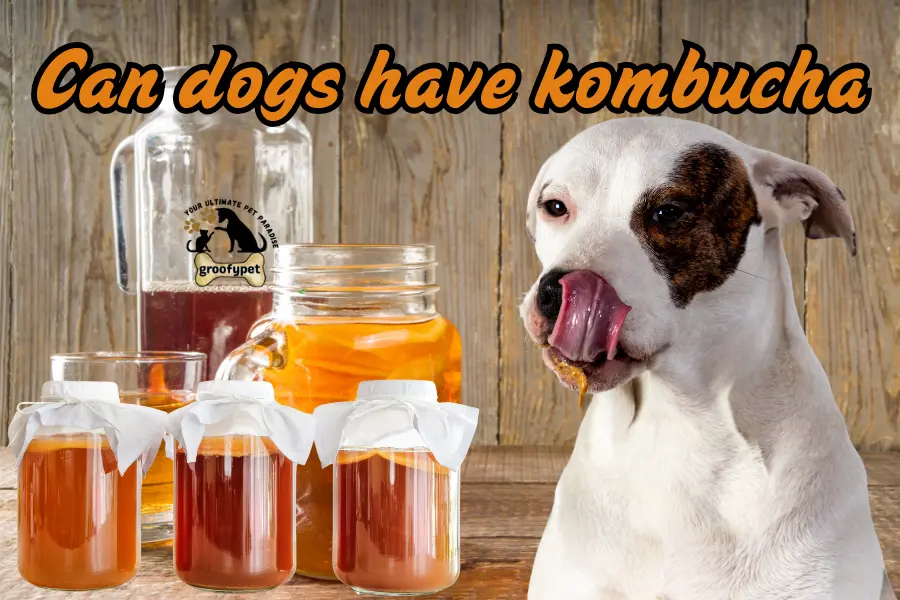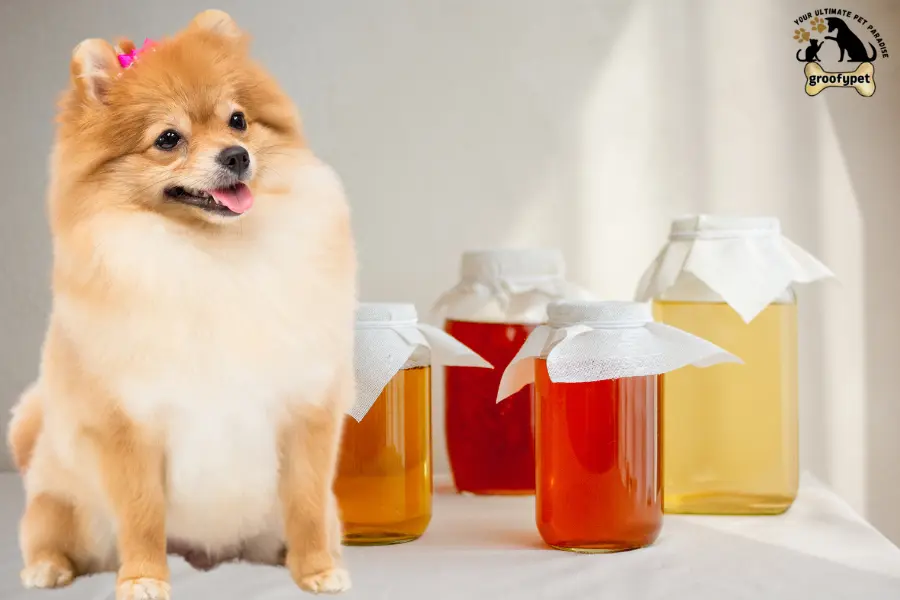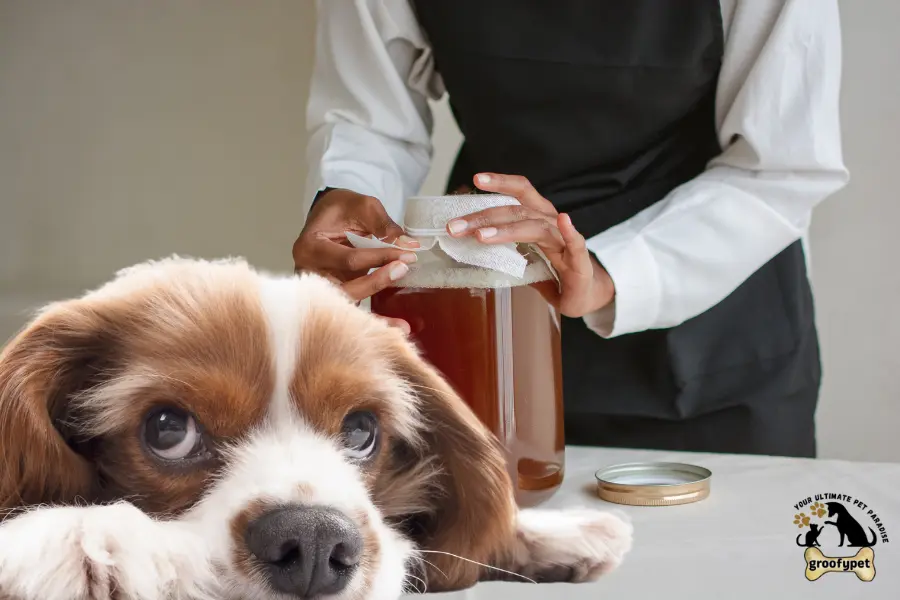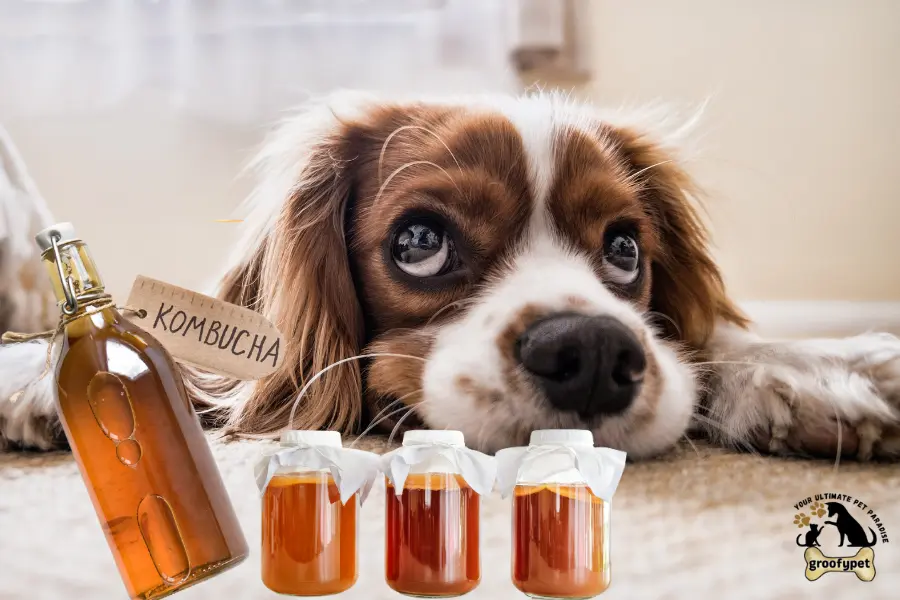
Can dogs have kombucha? While kombucha is a popular fermented tea enjoyed by humans for its probiotic benefits it contains ingredients like caffeine, sugar and alcohol. These components can be harmful to dogs even in small amount. Vets consistently advise against giving kombucha to pets. It’s a human health drink not a safe treat for your dog.
Can dogs have kombucha? It sounds harmless just fizzy tea with some health benefits right? But what seems like a trendy and gut friendly drink for humans could actually pose serious risks for your pet. Should you really let your dog take a sip? The answer might surprise you.
You’re doing your best to feed your dog healthy things—so when you saw kombucha praised for digestion, it sounded promising. But can dogs have kombucha safely? Sadly, what’s good for your gut may harm theirs. Many dog owners make this mistake without knowing the dangers until it’s too late.
You leave your kombucha bottle on the table. Your dog sneaks a curious sip. Suddenly you’re wondering: can dogs have kombucha? This fizzy tea may seem harmless but for dogs it’s anything but. Let’s break down the facts before another sip gets spilled.
Can dogs have kombucha? No dogs should not drink kombucha. It contains sugar, caffeine and alcohol all are harmful to them. Even small amounts can cause upset stomach and vomiting. Kombucha is made for human not for pets. Always choose water or vet approved drinks for your dog safety.
Can dogs have kombucha?
No, dogs should not have kombucha. Is kombucha dog safe? Definitely not. It contains caffeine, sugar, and sometimes alcohol — all harmful to pets. Dogs drinking kombucha may experience upset stomachs, and some may show signs of illness quickly. The kombucha risks for dogs are too high, and it’s best avoided entirely, as kombucha is toxic to dogs.
Is kombucha safe for dogs in small amounts?
Some believe a small amount of kombucha for dogs is okay, but this is risky. Even a tiny sip of kombucha may result in problems due to caffeine, sugar, or alcohol. The kombucha effects on dogs can include digestive upset or more serious health issues. It’s simply not worth the risk.
What happens if a dog drinks kombucha?
If a dog drinks kombucha, dog kombucha side effects may show up quickly: vomiting, gas, diarrhea, or restlessness. Kombucha symptoms in dogs can worsen due to the alcohol or caffeine, especially in small dogs. If your dog drank kombucha, call your vet immediately.
Why kombucha may not be good for dogs?
Kombucha has many kombucha dangers for dogs. Sugar leads to weight gain and diabetes, caffeine affects the heart, and alcohol is toxic. The ingredients harmful to dogs, including bacteria and yeast not made for them, further prove kombucha is toxic to pets.

Symptoms to watch for if your dog drinks kombucha
Watch for kombucha poisoning dog signs:
- Vomiting, bloating, shaking, or sleepiness.
- Some show kombucha dog reactions like drooling or hiding.
- Take kombucha symptoms in pets seriously.
- contact your vet if symptoms last over an hour or worsen.
Kombucha: can It really benefit a dog health?
Let’s explore the claimed top 10 benefits of this trendy fermented tea and help dog owners make an informed decision. Kombucha has grown popular for its fizzy taste and potential kombucha health benefits in humans.
While its probiotic and antioxidant qualities make it appealing, dog owners must proceed with caution. Kombucha often contains caffeine, sugar, and alcohol—all of which are unsafe for dogs. That said let’s explore what kombucha might offer in theory and where safer kombucha alternatives for dogs might exist.
1. Probiotics and Gut Health
Kombucha is a well-known probiotic drink that can support gut health in humans. Probiotics help balance gut bacteria and support digestion. While dogs also benefit from probiotics they need strains specifically formulated for pets. Giving your dog kombucha could upset their digestive system instead of helping it.
2. Antioxidant Properties
Rich in tea-based antioxidants, kombucha can neutralize free radicals and reduce inflammation in humans. However, these same antioxidants come along with tea fermentation, which means caffeine—unsafe for dogs. Look for dog-safe antioxidant sources instead, like blueberries.
3. Immune System Support
In humans, a strong gut microbiome equals a stronger immune system. While kombucha supports this in people, dogs should only get vet-approved probiotics to boost their immunity safely. Kombucha dog safe versions don’t exist on the market.
4. Detoxification
Kombucha contains glucuronic acid, which may support liver detox in humans. But in dogs, ingredients like alcohol and caffeine can damage the liver, not cleanse it. Stick to clean water and vet-recommended liver supplements.
5. Heart Health Potential
Studies link kombucha to lower blood pressure and cholesterol—but these are human-based findings. Dogs do not share the same dietary needs or responses, and kombucha risks for dogs outweigh any potential heart perks.
6. Weight Management Support
While kombucha’s acetic acid may support metabolism in humans, its sugar content and unpredictable fermentation make it unsuitable for dogs. Better options include portion control, exercise, and low-calorie dog treats.
7. Gut-Brain Connection and Mood
The gut-brain axis suggests probiotics may influence mood. Dogs do experience anxiety, but kombucha is not a safe source of probiotic support. Instead, use probiotics for dogs or calming supplements made for canines.
8. Joint Support
Some kombucha may contain glucosamines, which help maintain joint health. However, kombucha isn’t a safe delivery method. Dogs with arthritis or mobility issues should get veterinary-approved joint supplements instead.
9. Antimicrobial Properties
Kombucha can inhibit harmful microbes in humans, but that doesn’t translate safely to pets. Its acidity and yeast content could disturb a dog’s gut flora, doing more harm than good.
10. Hydration and Energy
Though kombucha is hydrating for humans, it’s not suitable as a dog-friendly drink. Dogs should stick to fresh water or vet-approved hydration products. Kombucha’s mild caffeine may seem energizing, but it’s toxic for pets.
How much kombucha can I give my dog?
Dogs should not drink kombucha at all. Even a small amount can contain caffeine, alcohol or sugar which are harmful. Some dogs may get sick after just one sip especially small breeds or puppies. It’s safer to avoid giving any kombucha entirely.
Can dogs drink fermented drinks?
Only if the fermented drink is made specifically for dogs and approved by a vet. Regular fermented drinks like kombucha, kefir with added sugar or alcoholic brews are unsafe. They may upset your dog’s stomach or harm their organs. Stick with dog friendly probiotic options if needed.
Can I feed my dog kombucha SCOBY?
No, dogs should not eat kombucha SCOBY. The SCOBY (Symbiotic Culture of Bacteria and Yeast) is too strong for a dog gut. It may cause bloating, diarrhea, or more serious gut issues. The bacteria and yeast balance is made for humans—not for pets.
Can dogs drink ginger kombucha?
No, dogs should not drink ginger kombucha. Ginger may irritate their stomach, and the kombucha base still contains caffeine, alcohol, and sugar. These are all unsafe for dogs. Flavored kombucha, even with “natural” ingredients, can be even more dangerous than plain ones.
What to do if your dog drinks kombucha by accident?
If your dog drank kombucha, stay calm. Look at the label, then call your vet. This may be a kombucha emergency pets situation. Give water, but don’t induce vomiting unless instructed. Get vet help related to kombucha as soon as possible.
Does kombucha have alcohol? Can that hurt dogs?
Yes, kombucha alcohol content is a concern. Alcohol from fermentation is harmful. The alcohol effects on dogs may include lack of coordination or seizures. Fermented drinks and pets are never a safe mix.
What ingredients in kombucha are dangerous for dogs?
Several toxic kombucha ingredients pose risks: caffeine in kombucha, sugar, alcohol, and certain fruits/spices. These are unsafe foods for dogs and should be completely avoided.

Is there any dog safe version of kombucha?
Currently, safe kombucha for dogs does not exist. But there are dog probiotic drinks made without harmful elements. These are better kombucha alternatives for dogs if approved by a vet.
Can probiotics help dogs like kombucha helps humans?
Yes, but dogs need their own kind. While kombucha contains bacteria, not all kombucha bacteria are safe for dogs. Choose probiotics for dogs to support a healthy gut pets need.
Healthy alternatives to kombucha for dogs
Choose dog-friendly drinks like clean water or bone broth for dogs. These are better kombucha alternatives and can be frozen for a treat. Always go with dog-safe options.
Can puppies drink kombucha?
Absolutely not. Kombucha and puppies are a bad mix. Puppies drink kombucha at their own risk. The kombucha danger for young dogs is even higher due to their size and developing organs.
Also Read : Can dogs eat honey bun
Why do some people give kombucha to dogs?
Some believe in kombucha dog myths or fall for kombucha dog health claims. This causes kombucha pet confusion, but it’s a mistake. Dogs are not little humans always check with a vet.
Can dogs have kombucha scoby?
No, dogs should not eat kombucha scoby. The scoby is a dense mix of yeast and bacteria meant to ferment sweet tea for humans. For dogs it can cause bloating, gas or digestive upset. In some cases it may even lead to a dangerous imbalance in gut bacteria.
Can dogs have kombucha and ginger?
No, dogs should not have kombucha, even if it’s flavored with ginger. Kombucha contains caffeine, alcohol, and sugar, while ginger in high amounts can upset a dog stomach. Combined they pose more risk than benefit for dogs.
Can dogs have ginger?
In small amounts, plain ginger (fresh or powdered) can be safe for dogs and may help with nausea or motion sickness. But large doses of ginger mixed into spicy or sugary products can cause stomach upset. Always consult your vet before adding ginger to your dog’s diet.
Can dogs have kabocha squash?
Yes, cooked kabocha squash (with skin and seeds removed) is safe and healthy for dogs. It’s rich in fiber, beta-carotene, and vitamins A and C. Serve it plain—no added butter, salt, or spices.
Can dogs have guava?
Yes, ripe guava can be safe in small amounts. It offers vitamins A and C and fiber, but you must remove the seeds and skin, which can be choking hazards. Avoid giving guava-flavored products that contain sugar or preservatives.
Can cats have kombucha?
No, cats should not drink kombucha. Like dogs, they are sensitive to caffeine, alcohol, and sugar, all of which are commonly found in kombucha. Even small amounts can cause vomiting, diarrhea, or liver damage in cats. Keep all fermented drinks out of reach of pets.
What vets say about dogs and kombucha?
Vet advice Kombucha is clear: avoid it. Vets warn against sugar, caffeine, and alcohol. Kombucha is not safe for pets, and dog health vet tips recommend vet-approved supplements instead.
Is homemade kombucha better or worse for dogs?
Homemade kombucha danger is real. The kombucha brewing at home process is unpredictable, and added ingredients may harm pets. Pet risks kombucha increase with homemade versions.
Frequently Asked Questions
Can dogs have kombucha with ginger?
No. Ginger in kombucha can upset a dog’s stomach. It is not safe for them.
What should I do if my dog drank kombucha?
Call your vet. Watch your dog closely. Do not wait if you see any signs of sickness.
Is flavored kombucha safe for dogs?
No. Added fruits and spices can be toxic to dogs.
Can dogs drink other probiotic drinks?
Only if they are made for dogs and approved by a vet.
Why is kombucha bad for dogs?
Because it has sugar, caffeine, alcohol, and bacteria that are harmful to dogs.
Final thoughts
It is best to keep kombucha away from dogs. Can dogs have kombucha?While kombucha may have health benefits for people, it is not safe for pets. Dogs have different needs and more sensitive systems. They don’t benefit from fermented tea or kombucha ingredients like humans do. Stick to clean water and approved probiotic drinks for your pup’s health and happiness.
Can Dogs Eat Queso Fresco? Signs You Should Stop Immediately!



